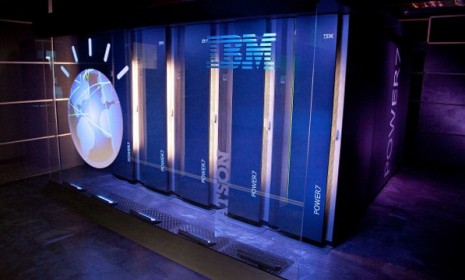Watson: First 'Jeopardy!'... now the doctor's office
The supercomputer made quick work of his human competitors on "Jeopardy!" Now his creators want Watson to help you stay healthy

A free daily email with the biggest news stories of the day – and the best features from TheWeek.com
You are now subscribed
Your newsletter sign-up was successful
IBM's supercomputer Watson conquered "Jeopardy!" by trouncing legendary champs Ken Jennings and Brad Rutter last week. Where does it go from here? The short answer is: The doctor's office. IBM has announced a deal with Nuance Communications Inc., along with the medical schools at Columbia University and University of Maryland, to develop Watson into a diagnostic tool for doctors. Here, a brief guide to Dr. Watson:
How would doctors use Watson?
Watson's analytical abilities will help doctors process and sift through information. The supercomputer's ability to pull relevant information from its massive memory bank in the blink of an eye will let physicians "rapidly consider all the related texts, reference materials, prior cases, and latest knowledge in journals and medical literature" so that they can quickly come up with informed diagnoses and treatment plans.
The Week
Escape your echo chamber. Get the facts behind the news, plus analysis from multiple perspectives.

Sign up for The Week's Free Newsletters
From our morning news briefing to a weekly Good News Newsletter, get the best of The Week delivered directly to your inbox.
From our morning news briefing to a weekly Good News Newsletter, get the best of The Week delivered directly to your inbox.
So this is a good thing, right?
"I think it's going to usher in the next generation of medicine," says Eliot Siegel, the vice chair of Maryland's department of diagnostic radiology, as quoted by TIME. "It takes me 20 minutes to an hour or more to read through a patient's electronic medical record. Having a computer understand and present the information to me is a huge step toward allowing me to make a better diagnosis. It is really the future of medicine."
But will machines replace doctors?
Some doctors are worried that medical professionals will become too dependent on computers. But Watson supporters say it will never replace human doctors; it will just help them do their jobs better. Siegel compares it to the popular medical TV show "House." Watson will be like one of the minor doctors helping Dr. House make a diagnosis, with the final call always coming from House.
A free daily email with the biggest news stories of the day – and the best features from TheWeek.com
When can I meet this Dr. Watson?
IBM says the first commercial version of the new "Jeopardy!" champ will be ready in 18 to 24 months.
Sources: TIME, Nuance.com, Network World
-
 Tourangelle-style pork with prunes recipe
Tourangelle-style pork with prunes recipeThe Week Recommends This traditional, rustic dish is a French classic
-
 The Epstein files: glimpses of a deeply disturbing world
The Epstein files: glimpses of a deeply disturbing worldIn the Spotlight Trove of released documents paint a picture of depravity and privilege in which men hold the cards, and women are powerless or peripheral
-
 Jeff Bezos: cutting the legs off The Washington Post
Jeff Bezos: cutting the legs off The Washington PostIn the Spotlight A stalwart of American journalism is a shadow of itself after swingeing cuts by its billionaire owner